BMW iX vs Hyundai IONIQ 5 - Differences and prices compared
Costs and Efficiency:
Looking at overall running costs, both models reveal some interesting differences in everyday economy.
Hyundai IONIQ 5 has a convincingly advantage in terms of price – it starts at 38500 £, while the BMW iX costs 71600 £. That’s a price difference of around 33086 £.
In terms of energy consumption, the advantage goes to the Hyundai IONIQ 5: with 15.60 kWh per 100 km, it’s to a small extent more efficient than the BMW iX with 17.80 kWh. That’s a difference of about 2.20 kWh.
As for range, the BMW iX performs somewhat better – achieving up to 701 km, about 131 km more than the Hyundai IONIQ 5.
Engine and Performance:
Under the bonnet, it becomes clear which model is tuned for sportiness and which one takes the lead when you hit the accelerator.
When it comes to engine power, the BMW iX has a slight edge – offering 659 HP compared to 650 HP. That’s roughly 9 HP more horsepower.
In acceleration from 0 to 100 km/h, the Hyundai IONIQ 5 is minimal quicker – completing the sprint in 3.50 s, while the BMW iX takes 3.80 s. That’s about 0.30 s faster.
In terms of top speed, the Hyundai IONIQ 5 performs slight better – reaching 260 km/h, while the BMW iX tops out at 250 km/h. The difference is around 10 km/h.
There’s also a difference in torque: BMW iX pulls distinct stronger with 1015 Nm compared to 770 Nm. That’s about 245 Nm difference.
Space and Everyday Use:
Whether family car or daily driver – which one offers more room, flexibility and comfort?
Seats: offers more seating capacity – vs .
In curb weight, Hyundai IONIQ 5 is evident lighter – 1955 kg compared to 2525 kg. The difference is around 570 kg.
In terms of boot space, the Hyundai IONIQ 5 offers barely noticeable more room – 520 L compared to 500 L. That’s a difference of about 20 L.
In maximum load capacity, the BMW iX performs slight better – up to 1750 L, which is about 170 L more than the Hyundai IONIQ 5.
When it comes to payload, BMW iX slight takes the win – 575 kg compared to 530 kg. That’s a difference of about 45 kg.
Who wins the race?
The Hyundai IONIQ 5 proves to be leads convincingly overall and therefore becomes our DriveDuel Champion!
Hyundai IONIQ 5 is the better all-rounder in this comparison.
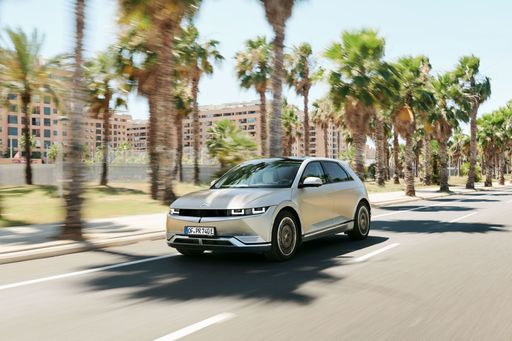 @ Hyundai Motor Company
@ Hyundai Motor Company
Hyundai IONIQ 5
Costs and Consumption
View detailed analysis
Engine and Performance
View detailed analysis
Dimensions and Body
View detailed analysis
BMW iX
The BMW iX arrives like a tech-rich luxury SUV that refuses to shout, offering a serene yet authoritative road presence that suits both city commutes and long-distance cruising. Inside, its minimalist cabin wraps high-quality materials and clever interfaces around a driver-focused layout, making it feel more like a forward-thinking lounge than just another electric appliance — and yes, it still delivers the dynamic driving character you'd expect from a BMW.
details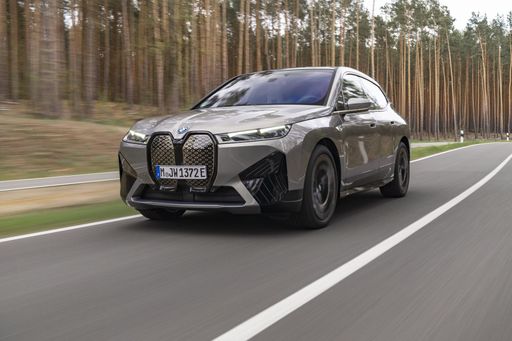 @ BMW Group Press
@ BMW Group Press
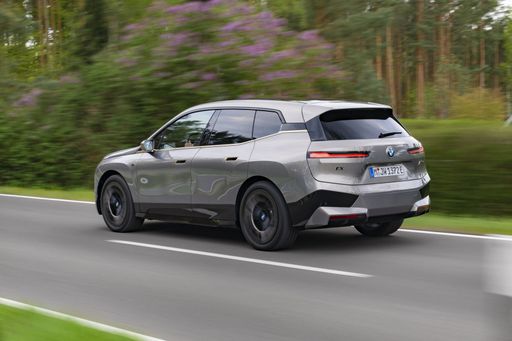 @ BMW Group Press
@ BMW Group Press
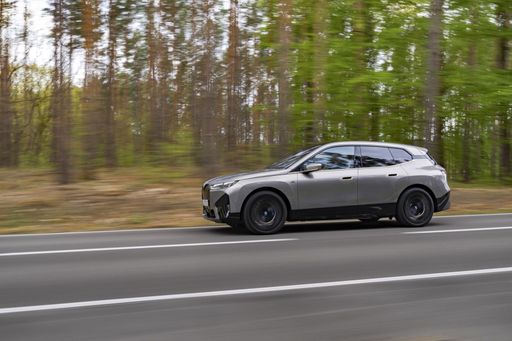 @ BMW Group Press
@ BMW Group Press
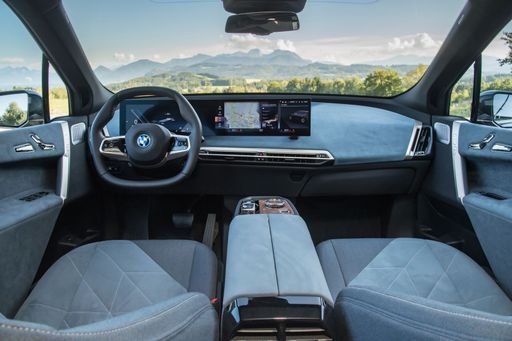 @ BMW Group Press
@ BMW Group Press
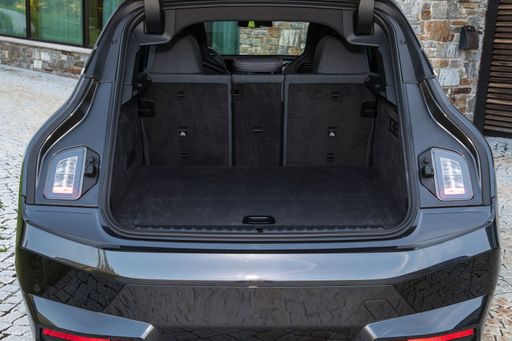 @ BMW Group Press
@ BMW Group Press
Hyundai IONIQ 5
The Hyundai IONIQ 5 looks like a spaceship that moved into suburbia, pairing bold retro‑futuristic styling with a roomy, cleverly laid-out cabin that makes long trips surprisingly comfortable. Its electric character delivers instant, silky acceleration and low running costs, making it a smart, slightly cheeky pick for buyers who want tech, practicality and personality without the drama.
details @ Hyundai Motor Company
@ Hyundai Motor Company
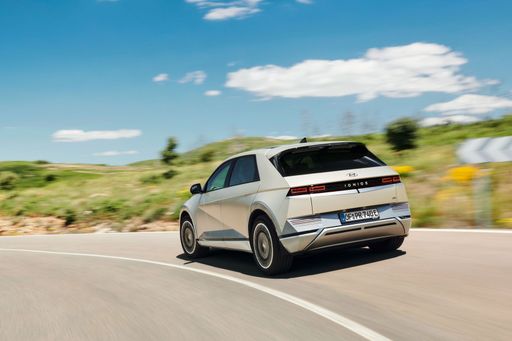 @ Hyundai Motor Company
@ Hyundai Motor Company
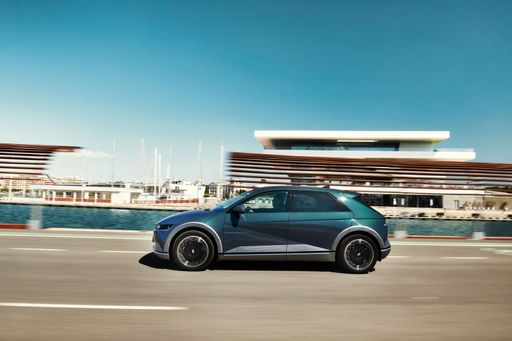 @ Hyundai Motor Company
@ Hyundai Motor Company
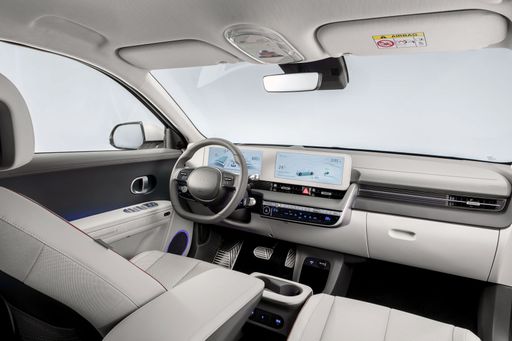 @ Hyundai Motor Company
@ Hyundai Motor Company
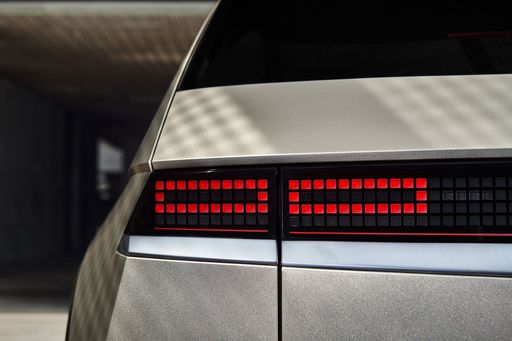 @ Hyundai Motor Company
@ Hyundai Motor Company
 @ BMW Group Press
@ BMW Group Press
|
 @ Hyundai Motor Company
@ Hyundai Motor Company
|
|
|
|
Costs and Consumption |
|
|---|---|
|
Price
71600 - 107100 £
|
Price
38500 - 64200 £
|
|
Consumption L/100km
-
|
Consumption L/100km
-
|
|
Consumption kWh/100km
17.8 - 20.6 kWh
|
Consumption kWh/100km
15.6 - 21.2 kWh
|
|
Electric Range
600 - 701 km
|
Electric Range
440 - 570 km
|
|
Battery Capacity
96 - 109.6 kWh
|
Battery Capacity
63 - 84 kWh
|
|
co2
0 g/km
|
co2
0 g/km
|
|
Fuel tank capacity
-
|
Fuel tank capacity
-
|
Dimensions and Body |
|
|---|---|
|
Body Type
SUV
|
Body Type
SUV
|
|
Seats
5
|
Seats
5
|
|
Doors
5
|
Doors
5
|
|
Curb weight
2525 - 2655 kg
|
Curb weight
1955 - 2275 kg
|
|
Trunk capacity
500 L
|
Trunk capacity
480 - 520 L
|
|
Length
4965 mm
|
Length
4655 - 4715 mm
|
|
Width
1970 mm
|
Width
1890 - 1940 mm
|
|
Height
1688 - 1695 mm
|
Height
1585 - 1605 mm
|
|
Max trunk capacity
1750 L
|
Max trunk capacity
1540 - 1580 L
|
|
Payload
505 - 575 kg
|
Payload
385 - 530 kg
|
Engine and Performance |
|
|---|---|
|
Engine Type
Electric
|
Engine Type
Electric
|
|
Transmission
Automatic
|
Transmission
Automatic
|
|
Transmission Detail
Reduction Gearbox
|
Transmission Detail
Reduction Gearbox
|
|
Drive Type
All-Wheel Drive
|
Drive Type
Rear-Wheel Drive, All-Wheel Drive
|
|
Power HP
408 - 659 HP
|
Power HP
170 - 650 HP
|
|
Acceleration 0-100km/h
3.8 - 5.1 s
|
Acceleration 0-100km/h
3.5 - 8.5 s
|
|
Max Speed
200 - 250 km/h
|
Max Speed
185 - 260 km/h
|
|
Torque
700 - 1015 Nm
|
Torque
350 - 770 Nm
|
|
Number of Cylinders
-
|
Number of Cylinders
-
|
|
Power kW
300 - 485 kW
|
Power kW
125 - 478 kW
|
|
Engine capacity
-
|
Engine capacity
-
|
General |
|
|---|---|
|
Model Year
2025
|
Model Year
2024 - 2025
|
|
CO2 Efficiency Class
A
|
CO2 Efficiency Class
A
|
|
Brand
BMW
|
Brand
Hyundai
|
Is the BMW iX offered with different drivetrains?
The BMW iX is offered with All-Wheel Drive.
The prices and data displayed are estimates based on German list prices and may vary by country. This information is not legally binding.
